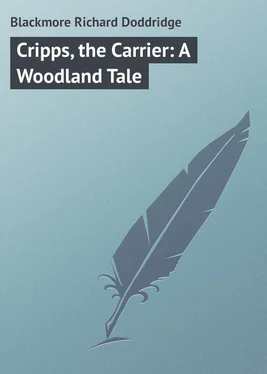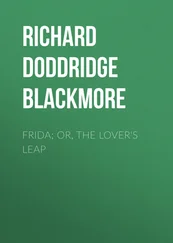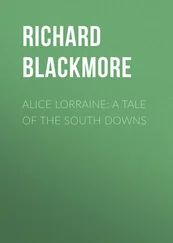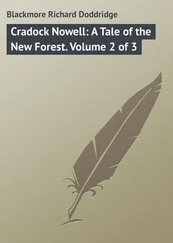Richard Blackmore - Cripps, the Carrier - A Woodland Tale
Здесь есть возможность читать онлайн «Richard Blackmore - Cripps, the Carrier - A Woodland Tale» — ознакомительный отрывок электронной книги совершенно бесплатно, а после прочтения отрывка купить полную версию. В некоторых случаях можно слушать аудио, скачать через торрент в формате fb2 и присутствует краткое содержание. ISBN: , Жанр: foreign_prose, на английском языке. Описание произведения, (предисловие) а так же отзывы посетителей доступны на портале библиотеки ЛибКат.
- Название:Cripps, the Carrier: A Woodland Tale
- Автор:
- Жанр:
- Год:неизвестен
- ISBN:http://www.gutenberg.org/ebooks/43281
- Рейтинг книги:4 / 5. Голосов: 1
-
Избранное:Добавить в избранное
- Отзывы:
-
Ваша оценка:
- 80
- 1
- 2
- 3
- 4
- 5
Cripps, the Carrier: A Woodland Tale: краткое содержание, описание и аннотация
Предлагаем к чтению аннотацию, описание, краткое содержание или предисловие (зависит от того, что написал сам автор книги «Cripps, the Carrier: A Woodland Tale»). Если вы не нашли необходимую информацию о книге — напишите в комментариях, мы постараемся отыскать её.
Cripps, the Carrier: A Woodland Tale — читать онлайн ознакомительный отрывок
Ниже представлен текст книги, разбитый по страницам. Система сохранения места последней прочитанной страницы, позволяет с удобством читать онлайн бесплатно книгу «Cripps, the Carrier: A Woodland Tale», без необходимости каждый раз заново искать на чём Вы остановились. Поставьте закладку, и сможете в любой момент перейти на страницу, на которой закончили чтение.
Интервал:
Закладка:
"I call this a very rum start, I do, about poor Squire's daughter."
The public of the public gazed with admiring approval at him. The sentiment was their own, and he had put it well and briefly. In different ways, according to the state and manner of each of them, they let him know that he was right, and might hold on by what he said. Then Master Hiss grew proud of this, and left it for some other body to bear the weight of thinking out. But even before his broad forefinger had quite finished with his pipe, and pressed the crown of fuel flat, a man of no particular wisdom, and without much money, could not check a weak desire to say something striking. His name was Batts, and he kept a shop, and many things in it which he could not sell. Before he spoke, he took precautions to secure an audience, by standing up, and rapping the table with the heel of his half-pint mug. "Hear, hear!" cried some young fellow; and Batts was afraid that he had gone too far.
"Gentlemen," said Grocer Batts, the very same man who had threatened to put his son into the carrying line, "I bows, in course, to superior wisdom, and them as is always to and fro. But every man must think his thoughts, right or wrong, and speak them out, and not be afeared of no one. And my mind is that in this here business, we be all of us going to work the wrong way altogether."
As no one had any sense as yet of having gone to work at all, in this or any other matter, and several men had made up their minds to be thrown out of work on the Saturday night if the bitter weather lasted, this great speech of Grocer Batts created some confusion.
"Let 'un go to work, hisself!" "What do he know about work?" "Altogether wrong! Give me the saw-dust for to clear my throat!" These and stronger exclamations showed poor Batts that it would have been better for trade if he had held his tongue. He hid his discomfiture in his mug, and made believe to drink, although it had ever so long been empty.
But Carrier Cripps had a generous soul. He did not owe so much as a halfpenny piece to Master Batts, neither did he expect to make a single halfpenny out of him – quite the contrary, in fact; and yet he came to his rescue.
"Touching what neighbour Batts have said," he began in his slow and steadfast voice, "it may be neither here nor there; and all of us be liable, in our best of times, to error. But I do believe as he means well, and hath a good deal inside him, and a large family to put up with. He may be right, and all us in the wrong. Time will show, with patience. I have knowed so many things as looked at first unlikely, come true as Gospel in the end, and so many things I were sure of turn out quite contrairy, that whenever a man hath aught to say, I likes to hearken to him. There now, I han't no more to say; and I leave you to make the best of it."
Zacchary rose, for his time was up; he saw that hot words might ensue, and he detested brawling. Moreover, although he did not always keep strict time with his horse and cart, no man among the living could be more punctual to his pillow. With kind "good-nights" from all, he passed, and left the smoky scene behind. As he stopped at the bar to say good-bye, and to pay his score to Amelia, for whom he had a liking, a short, quick, rosy man came in, shaking snow from his boots, and seeming to have lost his way that night. By the light from the bar, the Carrier knew him, and was about to speak to him, but received a sign to hold his tongue, and pass on without notice. Clumsily enough he did as he was bidden, and went forth, puzzled in his homely pate by this new piece of mystery.
For the man who passed him was John Smith, not as yet well-known, but held by all who had experience of him to be the shrewdest man in Oxford. This man quietly went into the sanded parlour, and took his glass, and showed good manners to the company. They set him down as a wayfarer, but a pleasant one, and well to do; and as words began to kindle with the friction of opinions, he listened to all that was said, but did not presume to side with any one.
CHAPTER VII.
THE BEST FOOT FOREMOST
The arrows of the snowy wind came shooting over Shotover. It was Saturday now of that same week with which we began on Tuesday. The mercury during those four days had not risen once above 28° of Fahrenheit, and now it stood about 22°, and lower than that in the river meadows. Trusty and resolute Dobbin never had a harder job than now. Some parts of Headington Hill give pretty smart collar-work in the best of times; and now with deep snow scarred by hoofs, and ridged by wheels, but not worn down, hard it seemed for a horse, however sagacious, to judge what to do. Dobbin had seen snow ere now, and gone through a good deal of it. But that was before the snow had fallen so thickly on his own mane and tail, and even his wise eyebrows. That was in the golden days, when youth and quick impatience moved him, and the biggest flint before his wheel was crushed, with a snort at the road-surveyor.
But now he was come to a different state of body, and therefore of spirit too. At his time of life it would not do to be extravagant of strength; it was not comely to kick up the heels; neither was it wise to cherish indignation at the whip. So now on the homeward road, with a heavy Christmas-laden cart to drag, this fine old horse took good care of himself, and having only a choice of evils, chose the least that he could find.
Alas, the smallest that he could find were great and very heavy ills. Scarcely any man stops to think of the many weary cares that weigh upon the back of an honest horse. Men are eloquent on the trouble that sits behind the horseman; but the silent horse may bear all that, and the troublesome man in the saddle to boot, without any poet to pity him. Dobbin knew all this, but was too much of a horse to dwell on it. He kept his tongue well under bit, and his eyes in sagacious blinkers, and sturdily up the hill he stepped, while Cripps, his master, trudged beside him.
Every "talented" man must think, whenever he walks beside a horse, of the superior talents of the horse – the bounty of nature in four curved legs, the pleasure there must be in timing them, the pride of the hard and goutless feet, the glory of the mane (to which the human beard is no more than seaweed in a billow), the power of blowing (which no man has in a comely and decorous form); and last, not least, the final blessing of terminating usefully in a tail. Zacchary Cripps was a man of five talents, and traded with them wisely; but often as he walked beside his horse, and smelled his superiority, he became quite humble, and wiped his head, and put his whip back in the cart again. The horse, on the other hand, looked up to Zacchary with soft faith and love. He knew that his master could not be expected quite to understand the ways a horse is bound to have of getting on in harness – the hundreds of things that must needs be done – and done in proper order, too – the duty of going always like a piece of the finest music, with chains, and shafts, and buckles, and hard leather to be harmonized, and the load which men are not born to drag, until they make it for themselves. Dobbin felt the difference, but he never grumbled as men do.
He made the best of the situation; and it was a hard one. The hill was strong against the collar; and, by reason of the snow, zigzag and the corkscrew tactics could not be resorted to. At all of these he was a dab, by dint of steep experience; but now the long hill must be breasted, and both shoulders set to it. The ruts were as slippery as glass, and did not altogether fit the wheels he had behind him; and in spite of the spikes which the blacksmith gave him, the snow balled on his hairy feet. So he stopped, and shook himself, and panted with large resolutions; and Cripps from his capacious pockets fetched the two oak wedges, and pushed one under either wheel; while Esther, who was coming home at last, jumped from her seat, to help the load, and patted Dobbin's kind nose, and said a word or two to cheer him.
Читать дальшеИнтервал:
Закладка:
Похожие книги на «Cripps, the Carrier: A Woodland Tale»
Представляем Вашему вниманию похожие книги на «Cripps, the Carrier: A Woodland Tale» списком для выбора. Мы отобрали схожую по названию и смыслу литературу в надежде предоставить читателям больше вариантов отыскать новые, интересные, ещё непрочитанные произведения.
Обсуждение, отзывы о книге «Cripps, the Carrier: A Woodland Tale» и просто собственные мнения читателей. Оставьте ваши комментарии, напишите, что Вы думаете о произведении, его смысле или главных героях. Укажите что конкретно понравилось, а что нет, и почему Вы так считаете.












